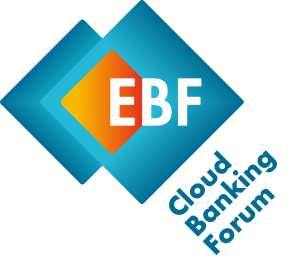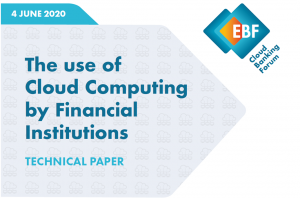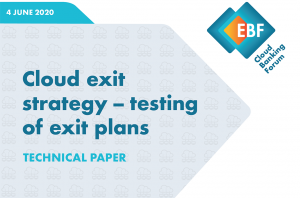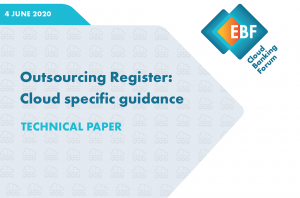JOINT STATEMENT
x
Joint industry statement calls for removing sovereignty requirements from European Cybersecurity Certification Scheme for Cloud Services (EUCS)
x
BRUSSELS, 21 November 2023 – The European Banking Federation (EBF), together with the European Savings Banks Group (ESBG), the Association for Financial Markets in Europe (AFME), the European Payment Institutions Federation (EPIF), and Insurance Europe have co-signed a joint statement on the ongoing process of developing a cybersecurity certification scheme for cloud services (EUCS). While the industry welcomes the objective of establishing a minimum set of security and trust criteria for cloud services, the drafting of EUCS should be a purely technical process detailing the technical requirements for such certification.
ENISA’s current candidate scheme includes political and legal sovereignty elements, such as the requirement to have the company’s headquarters located in the EU, restrictions on ownership and governance restrictions. As things stand today, the inclusion of such requirements will be a step back and will ultimately undermine real competition in the European market, reduce choice for cloud customers and harm European industry and citizens.
Cloud adoption by financial services, which is steadily increasing, is key to improving agility, international competitiveness, resilience, client experience and cost efficiency, and even security. Depriving companies of a real choice of cloud providers will endanger their operational resilience and stifle digital innovation, while the lack of transparency in the process is also concerning.
x
For more information please contact:
Dimos Karalis
Policy Adviser, Cybersecurity & Innovation, d.karalis@ebf.eu
x
About the EBF:
The European Banking Federation is the voice of the European banking sector, bringing together 32 national banking associations in Europe that together represent a significant majority of all banking assets in Europe, with 3,500 banks – large and small, wholesale and retail, local and international – while employing approximately two million people. EBF members represent banks that make available loans to the European economy in excess of €20 trillion and that reliably handle more than 400 million payment transactions per day. Launched in 1960, the EBF is committed to a single market for financial services in the European Union and to supporting policies that foster economic growth.
The post Joint industry statement calls for removing sovereignty requirements from European Cybersecurity Certification Scheme for Cloud Services (EUCS) appeared first on EBF.
]]>Banks’ cloud adoption boosted by policy dialogue
EBF PRESS RELEASE
Banks’ cloud adoption boosted by policy dialogue
BRUSSELS, 8 July 2019 – At its second public event, the EBF Cloud Banking Forum will mark significant progress towards rapid adoption of public and hybrid cloud solutions by banks. In particular, the steps taken for clear supervisory oversight in Europe. Participants in the forum have given more insight in the state of cloud adoption by European banks and have paved the way for a common understanding of requirements, such as reporting and testing of exit plans.
Since its inception two years ago, the EBF Cloud Banking Forum has established a much-needed exchange between IT architects, legal experts and cloud specialists from banks and cloud services providers. EU authorities including the European Central Bank, European Banking Authority and the European Commission act as observers.
Cloud technology allows large contributors to the Digital Single Market, including banks, to modernise their IT architecture and business processes drastically, ultimately gaining cost efficiency. Many banks are eager to adopt. However, the migration from on-premise solutions to a multi-cloud environment is a meticulous effort for banks that requires thorough assessment of risk and control levels. Through its work, the EBF Cloud Banking Forum looks to foster a coherent approach across the EU that can only be achieved with the comprehension of all involved authorities. Only with all the risk, reporting and compliance expectations aligned, banks will be enabled to adopt public and hybrid cloud solutions within a competitive timeframe.
For more information and all the deliverables of the EBF Cloud Banking Forum including technical recommendations and lists of participating organisations please visit www.ebf.eu/cloudbanking
For more information about the EBF Cloud Banking Forum:
Julian Schmücker, Policy Adviser Digital and Retail, j.schmucker@ebf.eu
Media contact:
Nahuel Mercedes, Communications Officer, +32 474 98 13 61, n.mercedes@ebf.eu
About the EBF:
The European Banking Federation is the voice of the European banking sector, uniting 32 national banking associations in Europe that together represent some 4,500 banks – large and small, wholesale and retail, local and international – employing about 2.1 million people. EBF members represent banks that make available loans to the European economy in excess of €20 trillion and that securely handle more than 400 million payment transactions per day. Launched in 1960, the EBF is committed to creating a single market for financial services in the European Union and to supporting policies that foster economic growth.
Latest posts
- EU T+1 Industry Committee launches roadmap and opens consultation period for capital markets transformation
- European Credit Sector Associations welcome efforts to strengthen European retail payments
- The EU T+1 Industry Committee finalises High-Level Road Map
- Vacancy: Innovation and Cybersecurity Trainee
- New study stresses urgent need for regulatory capital efficiency
Subscribe to the EBF Weekly + FinReg Agenda
Every Friday at noon you can receive the EBF Weekly + Financial Regulation Agenda. This agenda presents an overview of upcoming European and international meetings and conferences in financial regulation, as well as important general financial and economic events and key EBF meetings for the week ahead. CLICK HERE TO SUBSCRIBE
Subscribe to the EBF Morning Brief
The EBF Morning Brief is published Monday through Friday morning and brings you the top banking headlines, relevant announcements from the EU institutions and the latest from the EBF and its members, national banking associations in 32 countries in Europe. CLICK HERE TO SUBSCRIBE
The post Banks’ cloud adoption boosted by policy dialogue appeared first on EBF.
]]>EBF Cloud Banking Forum: LinkedIn articles
EBF Cloud Banking Forum Series

Between October and December 2020 members of the EBF Cloud Banking Forum wrote LinkedIn articles to raise awareness on three technical papers published by the Forum, delivering technical guidance for the adoption and usage of cloud computing under the regulatory framework in Europe.
Providing technical guidance to achieve cloud adoption at scale
Author: Julian Schmücker, Senior Adviser – Digital Innovation at EBF
To open the EBF Cloud series, Julian Schmücker explains why cloud computing is not only about data storage: it is a key enabling technology that offers computing power in an agile way and provides new infrastructure and software solutions for businesses. Read more
Harmonizing the approach to cloud adoption
Author: Rik De Deyn, Sr Director Financial Services Strategy at Oracle Financial Services
Oracle Financial Services supports the Forum’s goal to harmonize the regulatory and supervisory approach to cloud adoption in Europe, based on fundamental insights in the Forum’s technical paper on “The use of Cloud Computing by Financial Institutions.” Read more
Developing trust in the adoption of cloud
Author: Yasmine Charafeddine, Corporate Counsel – Financial Services & Privacy at Salesforce
The EBF Cloud Banking Forum and Salesforce foster trust in the adoption of cloud, offering additional guidance on cloud reporting under the European Banking Authority’s (EBA) Outsourcing Guidelines. Read more
Guiding stakeholders for cloud exit strategy testing
Author: Heather Hinton, PhD., Vice President, Distinguished Engineer, Cloud – Cognitive Software CISO at IBM
The EBF Cloud Banking Forum and IBM discuss the necessity for clear guidance on when and how to test exit plans, looking at appropriateness and sufficiency of testing, according to the Forum’s technical paper on “Cloud Exit Strategy – testing of exit plans.” Read more
Exploring cloud adoption in financial services
Author: Maria E. Tsani, Head of Financial Services Public Policy – EMEA at Amazon Web Services
As part of the EBF Cloud series, the EBF Cloud Banking Forum and Amazon Web Services explore the three key benefits that drive innovation for financial institutions. Read more
Improving risk management in the cloud
Author: Joe Tan, Product Counsel – Financial Services at Google Cloud
As part of the EBF Cloud series, the EBF Cloud Banking Forum and Google reflect on the technical paper for the Outsourcing Register (cloud-specific template) and conclude that an open dialogue is key to digital transformation. Read more
Guiding cloud exit planning
Author: Tom Deprins, Business Program Manager, CISA, CIPP/E – Global Financial Services Regulatory Compliance at Microsoft
As part of the EBF Cloud series, the EBF Cloud Banking Forum and Microsoft propose guidance for cloud exit strategies and the testing of exit plans. Read more
Promoting cloud adoption at scale
Author: Drs. Patrick Maes, Chair of the EBF Cloud Banking Forum and EBF Cloud Expert Group
To conclude the EBF Cloud series, Drs. Patrick Maes, Chair of the EBF Cloud Banking Forum and Cloud Expert Group underlines the key elements of promoting cloud adoption at scale for financial services. Read more
EBF Cloud Banking three technical papers
x
More information on the cloud at EBF and the Cloud Banking Forum are available at the EBF Cloud Banking page
x
x
For more information about the EBF Cloud Banking Forum:
Julian Schmücker, Senior Policy Adviser Digital Innovation, j.schmucker@ebf.eu
Latest posts
- EU T+1 Industry Committee launches roadmap and opens consultation period for capital markets transformation
- European Credit Sector Associations welcome efforts to strengthen European retail payments
- The EU T+1 Industry Committee finalises High-Level Road Map
- Vacancy: Innovation and Cybersecurity Trainee
- New study stresses urgent need for regulatory capital efficiency
Subscribe to the EBF Weekly + FinReg Agenda
Every Friday at noon you can receive the EBF Weekly + Financial Regulation Agenda. This agenda presents an overview of upcoming European and international meetings and conferences in financial regulation, as well as important general financial and economic events and key EBF meetings for the week ahead. CLICK HERE TO SUBSCRIBE
Subscribe to the EBF Morning Brief
The EBF Morning Brief is published Monday through Friday morning and brings you the top banking headlines, relevant announcements from the EU institutions and the latest from the EBF and its members, national banking associations in 32 countries in Europe. CLICK HERE TO SUBSCRIBE
The post EBF Cloud Banking Forum: LinkedIn articles appeared first on EBF.
]]>Outsourcing to Cloud Service Providers – EBF responds to consultation on ESMA guidelines
CONSULTATION RESPONSE
x
Guidelines on Outsourcing to Cloud Service Providers – EBF responds to ESMA consultation
BRUSSELS, 1 September 2020 – The European Banking Federation has responded to the European Securities and Markets Authority (ESMA) consultation on Guidelines on Outsourcing to Cloud Service Providers and has called for a strong alignment of the ESMA guidelines with the existing guidelines of the European Banking Authority (EBA) in order to prevent a disproportionate burden for financial institutions covered by both regimes.
Looking at the already published EBA Guidelines on outsourcing arrangements from 25 February 2019, European banks already face a dedicated set of requirements for outsourcing, including cloud computing services.
Implementation of the guidelines by the national competent authorities in European member states provides the framework for banks’ cloud adoption. The EBF considers it of utmost importance to provide banks with a consistent supervisory framework, avoiding diverging requirements across the EBA and ESMA guidelines.
There should be one single set of rules. To avoid an excessive unnecessary burden and disproportionate effects on dual regulated firms under both sets of guidelines, European banks encourage an explicit reference in the ESMA guidelines stating that banks which are compliant with the EBA requirements should also be considered compliant by the national competent authority in regard to the ESMA rules. The EBF invites ESMA to consider the respective example of a reference such as paragraph 4 in the introduction of the EIOPA guidelines on outsourcing to cloud service provides, as issued in February 2020.
The EBF welcomes ESMA’s understanding that the main risks associated with cloud outsourcing are similar across sectors. ESMA has considered the recent guidelines published by EBA and EIOPA. However, EBF has identified a number of details within the ESMA guidelines where presentation and/or details of the requirements in question deviate from the established EBA guidelines. EBF invites ESMA to reconsider the identified deviations and to stronger align with existing EBA requirements. Where considered helpful, further exploratory guidance – in turn required to be aligned with EBA guidelines – is suggested. Such alignment will prevent detrimental burdens for banks – in terms of time, work effort and respective costs – by enabling streamlined compliance with both EBA and ESMA supervisory framework. A fragmented approach will otherwise make it difficult for firms who are regulated by both the EBA and ESMA, ultimately impairing on the ability to adopt cloud banking at scale.
Click here for the EBF response submitted in the ESMA consultation
x
For more information:
Julian Schmücker, Policy Adviser Digital Innovation, j.schmucker@ebf.eu
For more about the EBF Cloud Banking Forum:
Latest posts
- EU T+1 Industry Committee launches roadmap and opens consultation period for capital markets transformation
- European Credit Sector Associations welcome efforts to strengthen European retail payments
- The EU T+1 Industry Committee finalises High-Level Road Map
- Vacancy: Innovation and Cybersecurity Trainee
- New study stresses urgent need for regulatory capital efficiency
Subscribe to the EBF Weekly + FinReg Agenda
Every Friday at noon you can receive the EBF Weekly + Financial Regulation Agenda. This agenda presents an overview of upcoming European and international meetings and conferences in financial regulation, as well as important general financial and economic events and key EBF meetings for the week ahead. CLICK HERE TO SUBSCRIBE
Subscribe to the EBF Morning Brief
The EBF Morning Brief is published Monday through Friday morning and brings you the top banking headlines, relevant announcements from the EU institutions and the latest from the EBF and its members, national banking associations in 32 countries in Europe. CLICK HERE TO SUBSCRIBE
The post Outsourcing to Cloud Service Providers – EBF responds to consultation on ESMA guidelines appeared first on EBF.
]]>EBF Cloud Banking Forum releases three technical papers
EBF Cloud Banking Forum releases three technical papers
x
BRUSSELS, 9 June 2020 – As cloud adoption by European Banks is key to the success of digital finance and innovation, the need for supervisory coordination and implementation becomes more evident. Through the Cloud Banking Forum, a cross-industry platform launched in 2017, EBF has published three technical papers providing legal and technical intelligence to National Competent Authorities of EU member states. The publications continue to build on the purpose and work of the EBF Cloud Banking Forum that brings together banks, cloud service providers, supervisors and policymakers to foster harmonised supervision of cloud services in the banking sector. All content has been drafted in the past year and reflects only a certain period of time. Data and methodology will be updated in the future as the market and policy cycles develop.
Says Alexandra Maniati, Head of Digital, European Banking Federation:
“Understanding the risks of cloud computing is essential to unlock its potential. European banks use technology widely to maintain resilience, boost innovation and support their clients, especially at times when digital infrastructure is necessary to respond to high usage at all levelels. The Cloud Banking Forum is a unique example of cross-industry cooperation that reflects the ambitions of the digital strategy of EBF and our wider banking community.”
x
More information on the cloud at EBF and the Cloud Banking Forum are available at the EBF Cloud Banking page
x
-
The use of Cloud
 The first paper aims to give better insight and understanding of cloud use by financial institutions, describing the different cloud service models that banks can deploy and the corresponding benefits on operations, performance, and cost structures. In addition, banks’ important risk awareness involved is further outlined, complimented with particular considerations for European supervisors, while elaborating on the steps towards a harmonised supervisory framework for stronger cloud adoption in Europe. It becomes clear that cloud computing is a key driver of a reliable data economy and service delivery, as it can connect banks with other financial institutions, customers and FinTech innovators seamlessly. This potential is shown through several use cases including Internet-of-Things and online collaboration. Download Paper
The first paper aims to give better insight and understanding of cloud use by financial institutions, describing the different cloud service models that banks can deploy and the corresponding benefits on operations, performance, and cost structures. In addition, banks’ important risk awareness involved is further outlined, complimented with particular considerations for European supervisors, while elaborating on the steps towards a harmonised supervisory framework for stronger cloud adoption in Europe. It becomes clear that cloud computing is a key driver of a reliable data economy and service delivery, as it can connect banks with other financial institutions, customers and FinTech innovators seamlessly. This potential is shown through several use cases including Internet-of-Things and online collaboration. Download Paper
x
-
Cloud exit strategy – testing of exit plans
 Continuity and quality are core features of financial institutions’ cloud-based services to clients. Both European banks and cloud service providers commit themselves to protecting this continuity and quality against detriment, including potential manifestations in case of an exit from a cloud arrangement. This paper emphasises the importance of exit plan testing, following the EBA Guidelines on Outsourcing requirement to secure sufficient testing. This paper offers a common understanding of banks and Cloud Service Providers on what such sufficient testing could possibly imply, looking for important harmonization across European jurisdictions. To that end, it looks at the questions: When is testing appropriate? What may constitute sufficient testing of exit plans? The content of this paper puts forward voluntary guidance while listing different exit plan testing methods. This can support financial institutions’ preparation for the eventuality of exiting cloud arrangements, thereby avoiding undue disruption to business activities. Download Paper
Continuity and quality are core features of financial institutions’ cloud-based services to clients. Both European banks and cloud service providers commit themselves to protecting this continuity and quality against detriment, including potential manifestations in case of an exit from a cloud arrangement. This paper emphasises the importance of exit plan testing, following the EBA Guidelines on Outsourcing requirement to secure sufficient testing. This paper offers a common understanding of banks and Cloud Service Providers on what such sufficient testing could possibly imply, looking for important harmonization across European jurisdictions. To that end, it looks at the questions: When is testing appropriate? What may constitute sufficient testing of exit plans? The content of this paper puts forward voluntary guidance while listing different exit plan testing methods. This can support financial institutions’ preparation for the eventuality of exiting cloud arrangements, thereby avoiding undue disruption to business activities. Download Paper
x
-
Cloud Outsourcing Register
 Under the EBA’s Outsourcing Guidelines, applicable since September 2019, banks should maintain an updated register of information on all qualifying outsourcing arrangements as part of their risk management framework. This document contains additional guidance on how each of the requirements of the Outsourcing Guidelines might be approached by banks on cloud-specific issues, taking into account the particularities of cloud outsourcing and its various deployment models. Mock cases for different cloud services seek to present guidance’s application in common scenarios. Download Paper
Under the EBA’s Outsourcing Guidelines, applicable since September 2019, banks should maintain an updated register of information on all qualifying outsourcing arrangements as part of their risk management framework. This document contains additional guidance on how each of the requirements of the Outsourcing Guidelines might be approached by banks on cloud-specific issues, taking into account the particularities of cloud outsourcing and its various deployment models. Mock cases for different cloud services seek to present guidance’s application in common scenarios. Download Paper
x
For more information about the EBF Cloud Banking Forum:
Julian Schmücker, Senior Policy Adviser Digital Innovation, j.schmucker@ebf.eu
Latest posts
- EU T+1 Industry Committee launches roadmap and opens consultation period for capital markets transformation
- European Credit Sector Associations welcome efforts to strengthen European retail payments
- The EU T+1 Industry Committee finalises High-Level Road Map
- Vacancy: Innovation and Cybersecurity Trainee
- New study stresses urgent need for regulatory capital efficiency
Subscribe to the EBF Weekly + FinReg Agenda
Every Friday at noon you can receive the EBF Weekly + Financial Regulation Agenda. This agenda presents an overview of upcoming European and international meetings and conferences in financial regulation, as well as important general financial and economic events and key EBF meetings for the week ahead. CLICK HERE TO SUBSCRIBE
Subscribe to the EBF Morning Brief
The EBF Morning Brief is published Monday through Friday morning and brings you the top banking headlines, relevant announcements from the EU institutions and the latest from the EBF and its members, national banking associations in 32 countries in Europe. CLICK HERE TO SUBSCRIBE
The post EBF Cloud Banking Forum releases three technical papers appeared first on EBF.
]]>EU Fintech Action Plan: first step towards a serious approach
PRESS RELEASE
- EC needs to serve as catalyst for igniting cross-border fintech ecosystem
BRUSSELS, 8 March 2018 – The European Banking Federation notes the release today of the European Commission’s Fintech Action Plan ‘For a more competitive and innovative European financial sector’, which recognises the transformative impact of financial innovations for users of financial services and for the banks that offer these.
The adoption of new technology and innovation in the financial sector has very clearly become a core driver of the European digital economy and EU’s Digital Single Market plans. The banking sector fully embraces these developments. Competition encourages the industry to become even more innovative with better services for clients. At the same time, banks continue to focus on security and privacy in order to maintain the trust that customers have always placed in them.
Financial technology is in the DNA of the banking industry, that is why the EBF fully supports the work of the Commission to put fintech at the forefront of the digital agenda in Europe. But the current ambition levels in the EU need to be raised to move away from the current patchwork of different regulatory approaches across the EU.
Moreover, if Europe wants to bolster the competitiveness of its financial industry, and compete stronger among leading global Fintech markets, we need to create room for innovative financial services in a flourishing Digital Single Market and push innovation to the limits.
Says Wim Mijs, Chief Executive Officer of the EBF:
“To fully unlock the potential of fintech we need a European ecosystem that lets financial services providers, old and new, be competitive, also on a global scale. This requires truly effective cooperation between national authorities. The Commission needs to serve as a catalyst so that we can ignite this cross-border fintech ecosystem with a flourishing digital single market. Only a real single market that is solidly underpinned by innovative, secure and reliable financial services can secure the jobs and growth we want.”
Since European banks foresee the applicability of new technologies such as distributed ledgers and artificial intelligence in finance, the EBF looks forward to the deliverables of the EU Blockchain Observatory, monitoring activities of virtual currencies, and removing obstacles for cloud adoption for financial services providers. All of which are key components of digital innovation and growth.
For several years now, the EBF has been actively engaged on the topic of financial technology in the context of EU regulation. The work started in 2014 with the digital publication of the EBF Blueprint ‘Driving the Digital Transformation’. The federation regularly publishes reports and positions and continues to actively engage with policymakers and a wide range of stakeholders.
The current EBF activities regarding the digital transformation in banking focus on payments and PSD2; distributed ledger technology and blockchain; cybersecurity; cloud banking; digital skills; e-identification; and data.
Background:
- Digital transformation in banking: http://bit.ly/2FqIqC6
- Innovate. Collaborate. Deploy: the EBF vision for banking in the Digital Single Market: http://bit.ly/2FcCMEe
- ‘Driving the Digital Transformation’, the EBF blueprint for digital financial services: ebfdigitalbanking.eu
- Payments and PSD2: http://bit.ly/2H8eGHg
- Cloud banking: http://bit.ly/2I2PumZ
- Cybersecurity: http://bit.ly/2Ha2dCU
- Digital Finance Europe conference (26 Sept.): digitalfinanceeurope.com
Media contact:
Nahuel Mercedes, Communications Officer, +32 2 508 3748, n.mercedes@ebf.eu
About the EBF:
The EBF serves as the voice of the European banking sector, uniting 32 national banking associations in Europe that together represent some 3,500 banks – large and small, wholesale and retail, local and international. Launched in 1960, the EBF is committed to creating a single market for financial services in the European Union and to supporting policies that foster economic growth.
Latest posts
- EU T+1 Industry Committee launches roadmap and opens consultation period for capital markets transformation
- European Credit Sector Associations welcome efforts to strengthen European retail payments
- The EU T+1 Industry Committee finalises High-Level Road Map
- Vacancy: Innovation and Cybersecurity Trainee
- New study stresses urgent need for regulatory capital efficiency
Subscribe to the EBF Weekly + FinReg Agenda
Every Friday at noon you can receive the EBF Weekly + Financial Regulation Agenda. This agenda presents an overview of upcoming European and international meetings and conferences in financial regulation, as well as important general financial and economic events and key EBF meetings for the week ahead. CLICK HERE TO SUBSCRIBE
Subscribe to the EBF Morning Brief
The EBF Morning Brief is published Monday through Friday morning and brings you the top banking headlines, relevant announcements from the EU institutions and the latest from the EBF and its members, national banking associations in 32 countries in Europe. CLICK HERE TO SUBSCRIBE
The post EU Fintech Action Plan: first step towards a serious approach appeared first on EBF.
]]>








